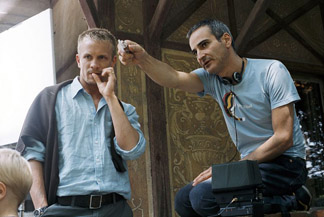|
|
Sole Criterion: Summer HoursBy Brett Ballard-BeachMay 10, 2012
Assayas’ frequent cinematographer Eric Gautier obtains a magnificent balance in shooting the interiors and exteriors of the film, finding great natural light in the idyllic meadows and fields that surround the family home, as well as inside the dwelling itself. This is not a film of gloomy shadows and dark chambers. This is mirrored as well in the score that finds both nostalgic tones and a more forward-looking modernity. Among his actors, Assayas gets the biggest surprise out of Juliette Binoche, almost unrecognizable in certain scenes underneath blonde highlights and a manner best expressed by an almost omnipresent slouch. Edith Scob as Helene has perhaps the trickiest role as she has to cast the long shadow (and some light) after she disappears from the film, so that we can see the effect Helene has on her children after she dies. Helene seems to hide a deeper melancholy underneath a surface eccentricity that’s far easier for her family to relate to and Scob is able to suggest the loggerheads of those two opposing emotional states. Which brings us to the quote at the top uttered by Frederic’s daughter, Sylvie. It is almost the final line of the film and it calls into question the wisdom of Helene’s thoughts earlier on the younger generation’s connection to items from their family’s past. Sylvie and her brother are hosting a weekend party for all their friends as a final goodbye to the house and Gautier’s camera functions almost as a party guest for the first part of this sequence following Sylvie and a friend through the rooms in a long tracking shot, simply observing youth at play, setting up music (several genres are chosen and rejected), smoking pot, hanging out. Sylvie goes off to find her boyfriend in the woods and it is in her brief conversation with him that the film becomes transcendentally beautiful and sad. In Sylvie’s mature acceptance of death and endings, Assayas finds a way to plant a seed for new beginnings. It is wholly appropriate that the film fades out on them hopping the fence and taking off through a field so they can stay hidden from their friends. As the camera gently rises and pulls back, Incredible Sting Band’s “Little Cloud” plays on the soundtrack, lead singer Robin Williamson musing: “And as my cloud pulled out of view/There came falling down a gentle shower of rain/Happy rain come falling down . . .And every drop as it fell, it smiled.”
|

|
|
|

|
Friday, November 1, 2024
© 2024 Box Office Prophets, a division of One Of Us, Inc.


